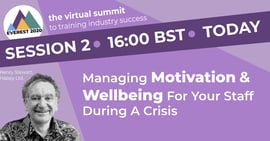Wellness at work: Lessons from COVID-19
-1.png)
Our health is something that we take for granted, until we are unwell. When this happens, it tends to both significantly lower our quality of life and impact our ability to perform well at work.
Many of us in society have benefited from the opportunity to talk more openly about our own wellness in recent years. In particular, with regard to mental health, we've also made great strides in making this a much less taboo topic. We're having conversations that would never have happened only a number of years ago, with employers in particular increasingly recognising the need and responsibility to support and promote the wellness of staff.
We've known for a while now that happy and healthy staff are more productive, creative, helpful, open, motivated, engaged, resilient and a whole list of other positive things. Unfortunately, for many, our wellness has been challenged at some point during the pandemic. However, there are lessons we can take from our collective experience in order to better manage employee wellbeing moving forward.
The pandemic
Let's start with the elephant in the room.
Unsurprisingly, the social distancing measures implemented to combat the pandemic has left many of us feeling isolated, lacking proper routine and distanced from our usual support network, all of which have contributed to poor mental health and general wellbeing.
The signs and signals of colleagues who may be struggling or even in distress are easy to miss without regular face to face interaction, relying on the courage of those in need of support to speak up or risk suffering in silence.
The pandemic may, objectively, be a relatively short period in the continuum of our lifetime, however in terms of disruption to society, we'll be hard pressed to find anything more destructive and unexpected. We've all had to adjust to a more restricted and solitary way of living and working - something inherently difficult for social beings.
The solution
Without a doubt, there's a requirement from all of us to try and support one another better and be more attentive and in-tune with our family, friends and co-workers. At the heart of wellness is effective communication, and thanks to technology, we have an abundance of channels to facilitate this.
As an employer, perhaps the best place to start is to ask your staff. Schedule a company wide meeting and gather the thoughts of your employees. Promoting wellness at work can include hundreds of different things, and your staff are bound to have different ideas and priorities of what that means to them. It was precisely this kind of open forum at accessplanit that lead to us introducing our EAP scheme mentioned below.
Wellness Initiatives
We're fortunate to have reached a time when there are resources and support out there for those in need. Admittedly, in society, we still have a long way to go to provide adequate support to everyone that needs it, however there are a number of great initiatives and schemes that employers can implement to help promote wellness at work.
At accessplanit, we've introduced a number of wellness initiatives over the past couple of years in order to better support our staff. Here are a few examples of initiatives that you could consider introducing in to your own business.
EAP Scheme
Perhaps the most impactful wellness initiative we have introduced at accessplanit is the Employee Assistance Program. These initiatives were uncommon only a few years ago, and were often associated with being expensive, rarely used by employees and unsuitable for small businesses - but that is simply not the case.
We partner with an EAP which provides confidential support both to employees of accessplanit and close family. With this, we have access to:
- An app and online portal loaded with resources
- 24-hour helpline
- Face to face and telephone counselling
- Critical incident support

An EAP offers a variety of services and may offer more than you would expect (it doesn't need to be work related!). Our EAP offers support with:
- Stress & anxiety
- Work advice
- Relationship advice
- Gambling issues
- Counselling
- Financial wellbeing
- Legal information
- Alcohol & drugs issues
- Family issues
- Childcare support
- Medical information
- Consumer issues
Mental Wellbeing sessions
Throughout the pandemic, accessplanit have hosted 30-minute weekly wellbeing sessions on Zoom. These are effectively an open forum for employees to openly discuss thoughts, feelings and emotions with colleagues and provide a support network for one another. Sometimes a topic for each session is planned in advance; previous topics we've discussed include motivation & morale, work/life balance and daily routine.
It's cathartic both to share your stories and hear others experiencing similar emotions and feelings that you are experiencing. It's also effective at building trust between peers and helps to construct new support networks moving forward.

Medicash
Medicash provide healthcare plans to organisations. As a partner, accessplanit employees receive cash back from things like dental bills and new glasses to therapy treatments and health screening. Learn more about the services Medicash provide.
Wellness Action Plan
A wellness action plan (or WAP) is a personalised, practical tool to be used to help identify what keeps you well at work, what causes you to become unwell, and how to address health problems at work should you be experiencing any.
This is a support document that helps to open up a dialogue with your manager, in order for them to better understand your needs and experiences and ultimately better support your health. Mind has a downloadable Wellness Action Plan on their website.
Sick Pay
It's not a new thing for companies to offer sick pay. Historically, this would be offered to employees too physically unwell to come in to work. Simply by recognising (and rebranding) your company sick pay to make employees aware that sickness can be of the body or the mind, is what's important. Whether these are simply labelled as sick days, mental health days or even 'duvet days', what's key is conveying the message that it is a good enough reason to warrant being off work.
Risk assessments
Ensuring that employees are well equipped to overcome the challenges of home working can be achieved through a risk assessment. This assessment typically consists of a broad number of different questions relating to things like the workspace, DSE (display screen equipment), safety from hazards, mental wellbeing and external factors.
These assessments are usually carried out by HR departments, aiming to 'pulse-check' the organisation to see what areas need improvement, and to quickly remedy any pressing or concerning issues that arise.
Lunch & Learn
We've previously had a representative from a local Mind come in to accessplanit HQ to talk to us about mental health. This practical workshop allowed us to share experiences, learn how to have difficult conversations when a friend, family member or colleague is struggling, practice coping mechanisms and learn what support is available in the local area.
We've also had a visit from The Art of Brilliance (below) who specialise in training and development to make you a more positive, motivated and brilliant human! These are high-energy presenters that are effective at getting your team hyped and learning how we can be our best more consistently. You can learn more about this on Medium.
With the switch to work from home, we now offer L&L sessions remotely alongside podcast clubs and frequent training sessions on topics such as time management, customer service and emotional intelligence.

Questions to ask
As an employer, if you're currently unsure about the measures you have in place to support and promote wellness within your organisation, ask yourself the following questions:
- Are your managers approachable, and would they know how to respond if a staff member was feeling unwell?
- What resources or support do you have in place to promote and support wellness?
- Do your staff have the environment and equipment they need to do their job safely and effectively both within and outside the office?
- Do employees know how they can receive support, and the channels they have available?
- How has COVID-19 changed your wellbeing strategy?
Takeaways
While much of this article focuses on the changes employers can make to better support staff wellness, in truth there's a responsibility for all of us to better look out for one another, never more so than in this time of disconnect and change.
The more solitary life we've all been living for the past year has presented a useful time for self reflection, including what it takes for us to maintain our wellness, and how we respond when we become unwell. This knowledge is particularly powerful in helping to shape how employers can better promote wellness at work moving forward.
With the examples we've introduced at accessplanit outlined above, hopefully it's become clear that many wellness initiatives don't rely on a great deal of investment and planning, rather a willingness and commitment to engage more with your staff. The best thing we can all do is have that conversation - and that's free!
Let us know in the comments any effective wellness initiatives your organisation has introduced!
Further resources
Coronavirus (COVID-19): Mental health support for employees - CIPD
Mental wellbeing while staying at home - NHS
Working safely during coronavirus (COVID-19) - UK GOV
121 Employee Wellness Program Ideas - Snacknation


